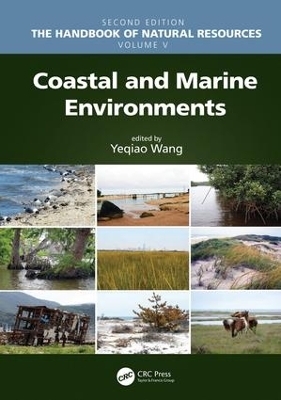
Coastal and Marine Environments
CRC Press (Verlag)
978-1-138-33963-7 (ISBN)
Authored by world-class scientists and scholars, The Handbook of Natural Resources, Second Edition, is an excellent reference for understanding the consequences of changing natural resources to the degradation of ecological integrity and the sustainability of life. Based on the content of the bestselling and CHOICE-awarded Encyclopedia of Natural Resources, this new edition demonstrates the major challenges that the society is facing for the sustainability of all well-being on the planet Earth. The experience, evidence, methods, and models used in studying natural resources are presented in six stand-alone volumes, arranged along the main systems of land, water, and air. It reviews state-of-the-art knowledge, highlights advances made in different areas, and provides guidance for the appropriate use of remote sensing and geospatial data with field-based measurements in the study of natural resources.
Volume 5, Coastal and Marine Environments, discusses marine and coastal ecosystems, their biodiversity, conservation, and integrated marine management plans. It provides fundamental information on coastal and estuarine systems and includes discussions on coastal erosion and shoreline change, natural disasters, evaporation and energy balance, fisheries and marine resource management, and more. New in this edition are discussions on sea level rise, renewable energy, coral reef restoration, fishery resource economics, and coastal remote sensing. This volume demonstrates the key processes, methods, and models used through many case studies from around the world.
Written in an easy-to-reference manner, The Handbook of Natural Resources, Second Edition, as individual volumes or as a complete set, is an essential reading for anyone looking for a deeper understanding of the science and management of natural resources. Public and private libraries, educational and research institutions, scientists, scholars, and resource managers will benefit enormously from this set. Individual volumes and chapters can also be used in a wide variety of both graduate and undergraduate courses in environmental science and natural science at different levels and disciplines, such as biology, geography, earth system science, and ecology.
Dr. Yeqiao Wang is a professor at the Department of Natural Resources Science, College of the Environment and Life Sciences, University of Rhode Island. He earned an MS and a PhD in natural resources management & engineering from the University of Connecticut. From 1995 to 1999, he was an assistant professor in the Department of Geography and Department of Anthropology, University of Illinois at Chicago. He has been on the faculty of the University of Rhode Island since 1999. In addition to his tenured position, he held an adjunct research associate position at the Field Museum of Natural History in Chicago. He has also served as a guest professor and an adjunct professor at universities in the U.S. and China. Among his awards and recognitions, Dr. Wang was awarded the prestigious Presidential Early Career Award for Scientists and Engineers (PECASE) by former U.S. President Clinton in 2000. His research projects have been funded by multiple agencies such as NASA, USDA, USDI, USAID, among others, which supported his scientific studies in various regions of the U.S., in East and West Africa, and in various regions in China. Besides peer-reviewed journal publications, Dr. Wang edited Remote Sensing of Coastal Environments and Remote Sensing of Protected Lands published by CRC Press in 2009 and 2010, respectively. He has also authored and edited over 10 scientific books in Chinese.
Section I: Terrestrial Coastal Environment 1. Aquaculture 2. Aquaforests and Aquaforestry: Africa 3. Coastal and Estuarine Waters: Light Behavior 4. Coastal and Estuarine Waters: Optical Sensors and Remote Sensing 5. Coastal Environments 6. Coastal Erosion and Shoreline Change 7. Coastal Natural Disasters: Tsunamis on the Sanriku Coast 8. Coral Reef: Biology and History 9. Coral Reef: Ecology and Conservation 10. Fisheries: Conservation and Management 11. Mangrove Forests 12. Tourism Management: Marine and Coastal Recreation 13. Science Communication for Natural Resource Managers: Techniques and Examples in Marine Systems 14. Quantifying Reef Ecosystem Services Section II: Marine Environment 15. Archaeological Oceanography 16. Arctic Hydrology 17. Bathymetry: Assessment 18. Bathymetry: Features and Hypsography 19. Bathymetry: Seafloor Mapping History 20. Marine Benthic Productivity 21. Marine Mammals 22. Marine Protected Areas 23. Marine Resource Management 24. Maritime Transportation and Ports 25. Markets, Trade, and Seafood 26. Water Cycle: Ocean’s Role 27. Climate Change Impacts and Adaptation for Coastal Transportation Infrastructure: A Sustainable Development Challenge for SIDS in the Caribbean and Beyond Section III: Coastal Change and Monitoring 28. Coastal Environments: Remote Sensing 29. Submerged Aquatic Vegetation: Seagrasses 30. Wetlands: Coastal, InSAR Mapping 31. A Hybrid Approach for Mapping Salt Marsh Vegetation 32. Remote Sensing of Coastal Wetlands of the Yellow River Delta Region 33. Coastal Change: Remote Sensing of Wetlands in Yangtze River Estuary 34. Remote Sensing of Mangrove Forests in an Environment of Global Change 35. Salt Marsh Mapping and Change Analysis: Remote Sensing 36. Tidal Effects in Salt Marsh Mapping: Remote Sensing
| Erscheinungsdatum | 12.06.2020 |
|---|---|
| Reihe/Serie | The Handbook of Natural Resources, Second Edition |
| Zusatzinfo | 28 Tables, black and white; 32 Illustrations, color; 122 Illustrations, black and white |
| Verlagsort | London |
| Sprache | englisch |
| Maße | 178 x 254 mm |
| Gewicht | 898 g |
| Themenwelt | Naturwissenschaften ► Biologie ► Ökologie / Naturschutz |
| Naturwissenschaften ► Geowissenschaften ► Hydrologie / Ozeanografie | |
| Technik ► Elektrotechnik / Energietechnik | |
| Technik ► Umwelttechnik / Biotechnologie | |
| ISBN-10 | 1-138-33963-6 / 1138339636 |
| ISBN-13 | 978-1-138-33963-7 / 9781138339637 |
| Zustand | Neuware |
| Informationen gemäß Produktsicherheitsverordnung (GPSR) | |
| Haben Sie eine Frage zum Produkt? |
aus dem Bereich


